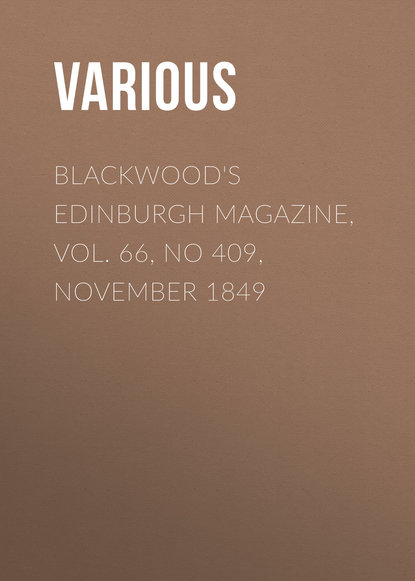По всем вопросам обращайтесь на: info@litportal.ru
(©) 2003-2024.
✖
Blackwood's Edinburgh Magazine, Vol. 66, No 409, November 1849
Автор
Год написания книги
2017
Настройки чтения
Размер шрифта
Высота строк
Поля
NORTH.
Pray, Talboys, explain to me this. The Banquet scene breaks up in most admired disorder – "stand not upon the order of your going – but go at once," – quoth the Queen. The King, in a state of great excitement, says to her —
"I will to-morrow,
(Betimes I will,) unto the weird sisters:
More shall they speak; for now I am bent to know,
By the worst means, the worst: for mine own good,
All causes shall give way; I am in blood
Stept in so far, that, should I wade no more,
Returning were as tedious as go o'er."
One might have thought not quite so tedious; as yet he had murdered only Duncan and his grooms, and to-night Banquo. Well, he does go "to-morrow and by times" to the Cave.
"Witch.– By the pricking of my thumbs,
Something wicked this way comes:
Open, locks, whoever knocks.
Macbeth.– How now, you secret, Black, and midnight Hags?"
It is a "dark Cave" – dark at all times – and now "by times" of the morning! Now – observe – Lenox goes along with Macbeth – on such occasions 'tis natural to wish "one of ourselves" to be at hand. And Lenox had been at the Banquet. Had he gone to bed after that strange Supper? No doubt, for an hour or two – like the rest of "the Family." But whether he went to bed or not, then and there he and another Lord had a confidential and miraculous conversation.
TALBOYS.
Miraculous! What's miraculous about it?
NORTH.
Lenox says to the other Lord —
"My former speeches have but hit your thoughts,
Which can interpret further; only, I say,
Things have been strangely borne: the gracious Duncan
Was pitied of Macbeth – marry he was dead.
And the right valiant Banquo walked too late;
Whom, you may say, if it please you, Fleance killed,
For Fleance fled."
Who told him all this about Banquo and Fleance? He speaks of it quite familiarly to the "other lord," as a thing well known in all its bearings. But not a soul but Macbeth, and the Three Murderers themselves, could possibly have known anything about it! As for Banquo, "Safe in a ditch he bides," – and Fleance had fled. The body may, perhaps in a few days, be found, and, though "with twenty trenched gashes on its head," identified as Banquo's, and, in a few weeks, Fleance may turn up in Wales. Nay, the Three Murderers may confess. But now all is hush; and Lenox, unless endowed with second sight, or clairvoyance, could know nothing of the murder. Yet, from his way of speaking of it, one might imagine crowner's 'quest had sitten on the body – and the report been in the Times between supper and that after-supper confab! I am overthrown – everted – subverted – the contradiction is flagrant – the impossibility monstrous – I swoon.
BULLER.
Water – water.
NORTH.
Thank you, Buller. That's revivifying – I see now all objects distinctly. Where was I? O, ay. The "other Lord" seems as warlock-wise as Lenox – for he looks forward to times when
"We may again
Give to our tables meat, sleep to our nights;
Free from our feasts and banquets bloody knives."
An allusion, beyond doubt, to the murder of Banquo! A sudden thought strikes me. Why, not only must the real, actual, spiritual, corporeal Ghost of Banquo sate on the stool, but "Lenox and the other Lord," as well as Macbeth, saw him.
BULLER.
Are you serious, sir?
NORTH.
So serious that I can scarcely hope to recover my usual spirits to-day. Have you, gentlemen, among you any more plausible solution to offer? All mum. One word more with you. Lenox tells the "other Lord"
"From broad words, and 'cause he fail'd
His presence at the tyrant's feast, I hear,
Macduff lives in disgrace; Sir, can you tell
Where he bestows himself?"
And the "other Lord," who is wonderfully well informed for a person "strictly anonymous," replies that Macduff —
"Is gone to pray the holy king, (Edward) on his aid
To wake Northumberland, and warlike Siward."
Nay, he minutely describes Macduff's surly reception of the King's messenger, sent to invite him to the Banquet, and the happy style of that official on getting the Thane of Fife's "absolute, Sir, not I," and D. I. O.! And the same nameless "Lord in waiting" says to Lenox, that
"this report
Hath so exasperate the king, that he
Prepares for some attempt of war."
I should like to know first where and when these two gifted individuals picked up all this information? The king himself had told the Queen, that same night, that he had not sent to Macduff – but that he had heard "by the way" that he was not coming to the Banquet – and he only learns the flight of Macduff after the Cauldron Scene – that is at end of it: —
"Macbeth. Come in, without there!
Enter Lenox.
Lenox. What's your Grace's will?
Macbeth. Saw you the Weird Sisters?
Lenox. No, indeed, my Lord.
Macbeth. Infected be the air whereon they ride;
And damn'd all those that trust them! – I did hear
The galloping of horse: Who was't came by?
Lenox.'Tis two or three, my Lord, that bring you word,
Macduff is fled to England.
Macbeth. Fled to England?"











